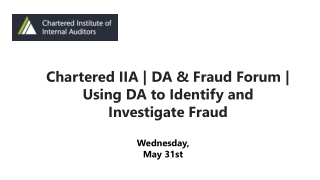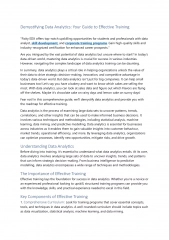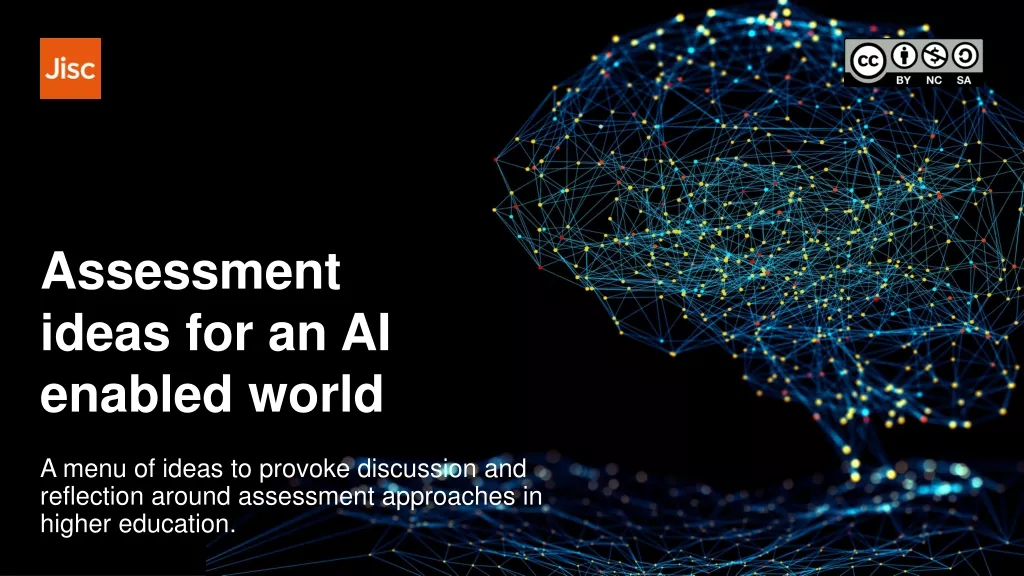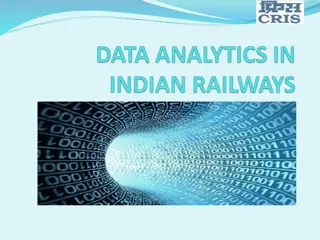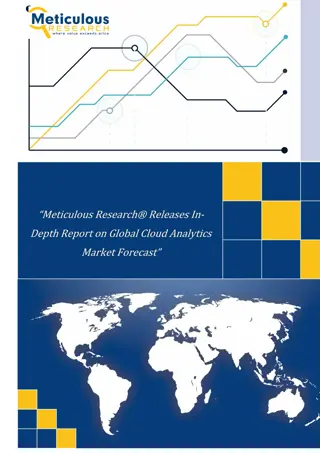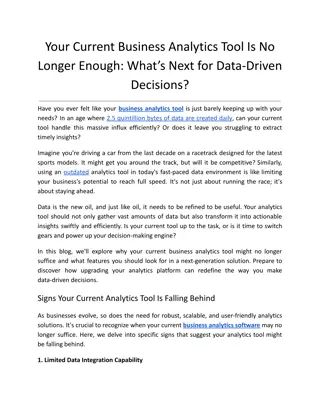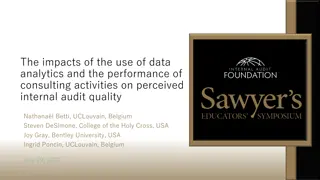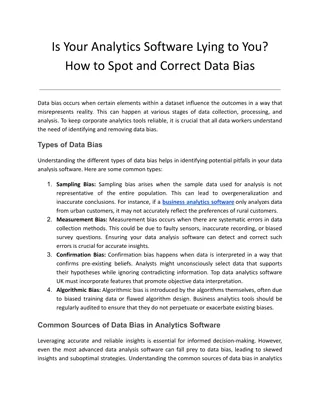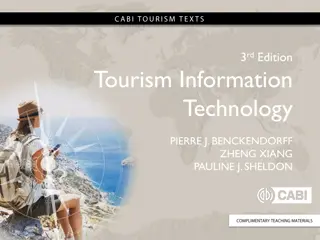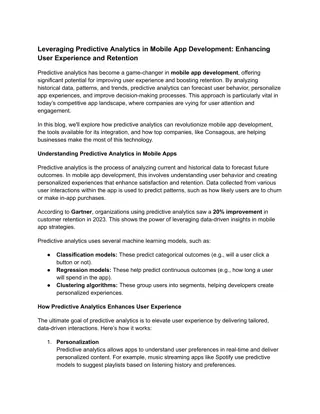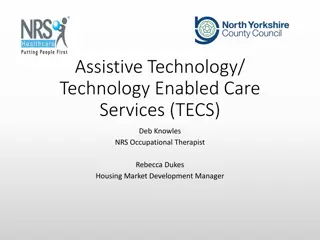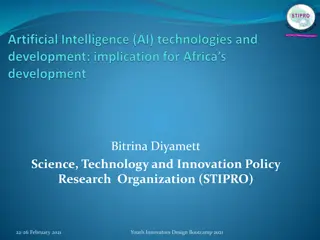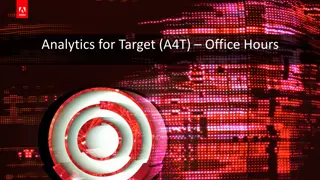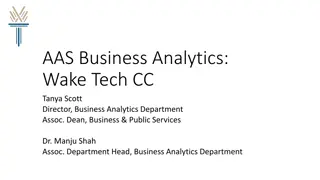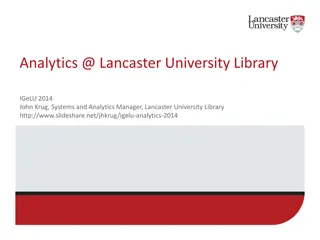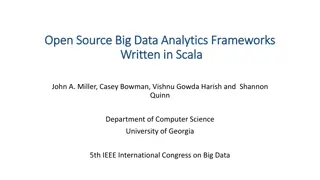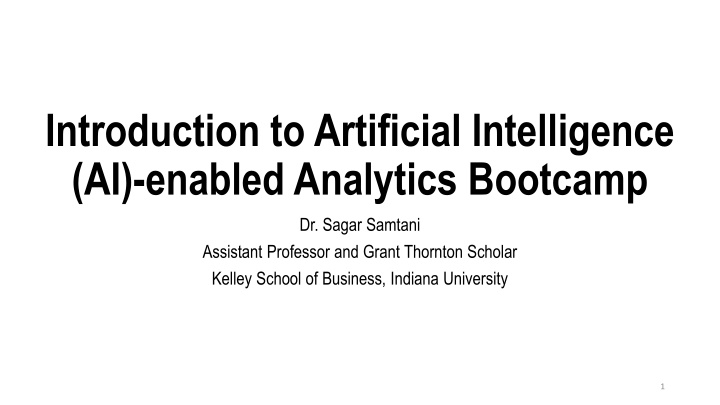
AI-enabled Analytics Bootcamp: Unleashing the Power of Artificial Intelligence
Explore the disruptive potential of Artificial Intelligence (AI) in various application areas through an abstracted approach to AI-enabled analytics. Dive into data collection, extraction, analysis, and visualization to gain actionable insights for informed decision-making. Understand how domain understanding drives successful AI implementations, across domains like BI&A, cybersecurity, and privacy. Join this bootcamp led by Dr. Sagar Samtani to fast-track your knowledge in AI-driven analytics.
Download Presentation

Please find below an Image/Link to download the presentation.
The content on the website is provided AS IS for your information and personal use only. It may not be sold, licensed, or shared on other websites without obtaining consent from the author. If you encounter any issues during the download, it is possible that the publisher has removed the file from their server.
You are allowed to download the files provided on this website for personal or commercial use, subject to the condition that they are used lawfully. All files are the property of their respective owners.
The content on the website is provided AS IS for your information and personal use only. It may not be sold, licensed, or shared on other websites without obtaining consent from the author.
E N D
Presentation Transcript
Introduction to Artificial Intelligence (AI)-enabled Analytics Bootcamp Dr. Sagar Samtani Assistant Professor and Grant Thornton Scholar Kelley School of Business, Indiana University 1
Bootcamp Background AI-enabled Analytics Artificial Intelligence (AI) has rapidly emerged as a key disruptive technology of the 21st century. AI has shown significant promise in various application areas, including robotics, game playing, drones, self-driving cars, and others. Increasingly, many organizations are seeking to identify how AI can help analyze their structured (e.g., transactions) and unstructured data (e.g., text, sensor signals). This interest is giving rise to an emerging field of AI-enabled analytics. An abstracted approach to conducting AI-enabled analytics is presented in Figure 1. 2
Bootcamp Background AI-enabled Analytics Phase 1: Data Collection and Aggregation Phase 2: Data Extraction and Representation Phase 4: Visualization and Presentation Phase 3: Analytics Description: Collect data from various source(s) based on domain need and/or business understanding Description: Pre- process collected data and structure (represent) data for analysis Description: Analyze collected data to produce relevant and actionable insights Description: Present data and analytics results to facilitate decision making Approaches: Machine learning, deep learning, text analytics, network science, entity matching, IR Approaches: APIs, web crawling, simple downloads, data warehouse querying Approaches: summary statistics, feature extraction, cleaning, imputation Approaches: Visualizations, dashboards, web front- ends, HCI Figure 1. An Abstracted (Domain-agnostic) Approach to Conducting AI-enabled Analytics 3
Bootcamp Background AI-enabled Analytics This process can be executed for different domains, including BI&A (Chen et al. 2012), cybersecurity (Samtani et al. 2020), and privacy (Samtani et al. 2021). Most successful implementations of AI-enabled analytics are based on a strong understanding of the domain or business being studied. Understanding of domain or business can be based on: How domain experts or professionals execute their tasks (e.g., workflows) Regulations and statutes e.g., HIPAA, GDPR, CCPA Extant frameworks e.g., cybersecurity risk management frameworks Open-source software packages has put the power of AI-enabled analytics into many organizations and individuals! 4
Bootcamp Objectives and Daily Agenda Bootcamp Objective: Provide a conceptual and hands-on introduction to fast-track participants into conducting end-to-end AI-enabled analytics with open-source tools. Impossible to cover everything in depth; focus will be on overview, intuition, and code samples. Bootcamp agenda roughly follows the overall AI-enabled Analytics lifecycle: Day 1: Data Collection and Storage Aggregate, query, and structure data for analytics. Day 2: Data Pre-Processing, ML and Text Mining Structure and pre-process data for input into classical ML algorithms, text mining tasks, and network science. Day 3: From ML to DL fundamentals of core DL (architectures, learning, extensions). Day 4: Visualization and Systems Development system development for end-users. Day 5: Research Presentations tie concepts together. See bootcamp outline and schedule document for full topical coverage 5
Bootcamp Logistics and Content Access Dates and Times (attendance taken daily): 5/27-5/31, 8 AM 12 PM (Taiwan time) 5/26-5/30, 8 PM 12 AM (US EDT) Access to materials is available through OneDrive: AI-enabled Analytics Bootcamp Materials Structured based on day and session, closely following bootcamp outline and schedule. Zoom details: Link remains the same for all sessions: https://iu.zoom.us/j/81894733462 Recordings will be accessible after the sessions. Technical prerequisites: Full-time access to laptop with webcam capabilities; Zoom access Anaconda and Jupyter installation: https://www.anaconda.com/ See bootcamp outline and schedule document for full list of Python packages 6
Instructors Faculty (Listed alphabetically by last name): Dr. Sagar Samtani, Indiana University, Kelley School of Business Dr. Hongyi Zhu, University of Texas, San Antonio, Alvarez College of Business Ph.D. Students (Listed alphabetically by last name): Ben Ampel, University of Arizona, AI Lab Ben Lazarine, Indiana University Amy Lin, University of Arizona, AI Lab Henry Yang, University of Arizona, AI Lab Steven Ullman, University of Arizona, AI Lab Big thank you!!! 7
References Chen, H., Chiang, R. H. L., and Storey, V. C. 2012. Business Intelligence andAnalytics: From Big Data To Big Impact, Management Information Systems Quarterly (36:4), pp. 1165 1188. (https://doi.org/10.1145/2463676.2463712). Samtani, S., Kantarcioglu, M., and Chen, H. 2020. Trailblazing the Artificial Intelligence for Cybersecurity Discipline: A Multi-Disciplinary Research Roadmap, ACM Trans. Manage. Inf. Syst. (11:4), New York, NY, USA: Association for Computing Machinery, pp. 1 19. (https://dl.acm.org/doi/abs/10.1145/3430360). Samtani, S., Kantarcioglu, M., and Chen, H. 2021. A Multi-Disciplinary Perspective for Conducting Artificial Intelligence-Enabled Privacy Analytics: Connecting Data,Algorithms, and Systems, ACM Trans. Manage. Inf. Syst. (12:1), New York, NY, USA: Association for Computing Machinery, pp. 1 18. (https://doi.org/10.1145/3447507). 8

